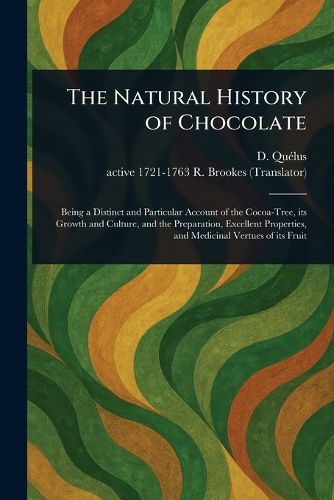Readings Newsletter
Become a Readings Member to make your shopping experience even easier.
Sign in or sign up for free!
You’re not far away from qualifying for FREE standard shipping within Australia
You’ve qualified for FREE standard shipping within Australia
The cart is loading…






This title is printed to order. This book may have been self-published. If so, we cannot guarantee the quality of the content. In the main most books will have gone through the editing process however some may not. We therefore suggest that you be aware of this before ordering this book. If in doubt check either the author or publisher’s details as we are unable to accept any returns unless they are faulty. Please contact us if you have any questions.
Discover the fascinating origins of chocolate in "The Natural History of Chocolate," a meticulously reprinted account by D. de Quelus. This early work, dating back to before 1800, delves into the cacao tree, its cultivation, and the preparation of its fruit, offering a distinct and particular exploration of cocoa.
Explore the cocoa-tree's natural history, encompassing its growth and culture alongside the beverage's celebrated properties and medicinal uses. This book details the preparation and virtues of what we know today as chocolate, illuminating its place in social history. Whether you're interested in the natural history of plants, the story behind one of the world's most beloved non-alcoholic beverages, or the historical uses of cacao, this book offers a unique glimpse into the past. From its medicinal virtues to its cultivation, "The Natural History of Chocolate" reveals the rich story behind this enduring ingredient.
This work has been selected by scholars as being culturally important, and is part of the knowledge base of civilization as we know it.
This work is in the public domain in the United States of America, and possibly other nations. Within the United States, you may freely copy and distribute this work, as no entity (individual or corporate) has a copyright on the body of the work.
Scholars believe, and we concur, that this work is important enough to be preserved, reproduced, and made generally available to the public. We appreciate your support of the preservation process, and thank you for being an important part of keeping this knowledge alive and relevant.
$9.00 standard shipping within Australia
FREE standard shipping within Australia for orders over $100.00
Express & International shipping calculated at checkout
Stock availability can be subject to change without notice. We recommend calling the shop or contacting our online team to check availability of low stock items. Please see our Shopping Online page for more details.
This title is printed to order. This book may have been self-published. If so, we cannot guarantee the quality of the content. In the main most books will have gone through the editing process however some may not. We therefore suggest that you be aware of this before ordering this book. If in doubt check either the author or publisher’s details as we are unable to accept any returns unless they are faulty. Please contact us if you have any questions.
Discover the fascinating origins of chocolate in "The Natural History of Chocolate," a meticulously reprinted account by D. de Quelus. This early work, dating back to before 1800, delves into the cacao tree, its cultivation, and the preparation of its fruit, offering a distinct and particular exploration of cocoa.
Explore the cocoa-tree's natural history, encompassing its growth and culture alongside the beverage's celebrated properties and medicinal uses. This book details the preparation and virtues of what we know today as chocolate, illuminating its place in social history. Whether you're interested in the natural history of plants, the story behind one of the world's most beloved non-alcoholic beverages, or the historical uses of cacao, this book offers a unique glimpse into the past. From its medicinal virtues to its cultivation, "The Natural History of Chocolate" reveals the rich story behind this enduring ingredient.
This work has been selected by scholars as being culturally important, and is part of the knowledge base of civilization as we know it.
This work is in the public domain in the United States of America, and possibly other nations. Within the United States, you may freely copy and distribute this work, as no entity (individual or corporate) has a copyright on the body of the work.
Scholars believe, and we concur, that this work is important enough to be preserved, reproduced, and made generally available to the public. We appreciate your support of the preservation process, and thank you for being an important part of keeping this knowledge alive and relevant.